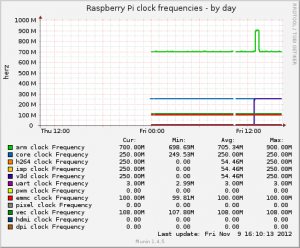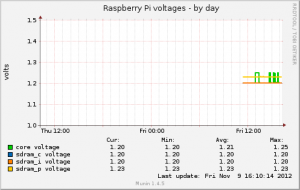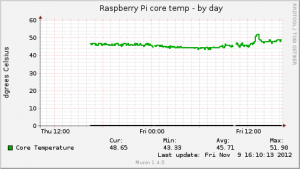I love Munin! I’ve finally got one of the Raspberry Pi’s to be reasonably stable, so I’ve set up a munin-node on it. The standard Linux sensord stuff doesn’t run on the arm core, so I had assumed I wouldn’t be able to see any exciting temperature graphs, but I was wrong!
The Raspberry Pi Debian image includes a command called vcgencmd, which allows root to interrogate various settings and measurements. That includes the temperature, clock frequencies and voltages across various components.
So I’ve knocked up a quick plugin for Munin which gathers that stuff and graphs it. You can get it over at GitHub here. The current code looks like this (but the GitHub copy will be most up-to-date),
[sourcecode language=”bash”]
#!/bin/bash
# -*- sh -*-
: << =cut
=head1 NAME
pisense_ – Wildcard-plugin to monitor Raspberry Pi sensors (temp, volts, clock speed)
=head1 CONFIGURATION
This plugin needs to be run as root for vcgencmd to work.
[pisense_*]
user root
=head2 ENVIRONMENT VARIABLES
This plugin does not use environment variables.
=head2 WILDCARD PLUGIN
This is a wildcard plugin. To specify if you want temperature,
clock speed or volts, link this file to _volt, _temp
or _clock.
For example,
ln -s /usr/share/munin/plugins/pisense_ \
/etc/munin/plugins/pisense_clock
will monitor the clock speeds of your pi.
=head1 BUGS
None known.
=head1 NOTES
This plugin is shamelessley based on the ip_ plugin (structure).
=head1 MAGIC MARKERS
#%# family=auto
#%# capabilities=autoconf suggest
=head1 AUTHOR
Tony (tony@darkstorm.co.uk).
=head1 LICENSE
It’s yours, do with it what you like.
=cut
. $MUNIN_LIBDIR/plugins/plugin.sh
sensor=${0##*/pisense_}
if [[ "$1" == "autoconf" ]]; then
if ! /opt/vc/bin/vcgencmd firmware >/dev/null 2>/dev/null; then
echo "no (could not run /opt/vc/bin/vcgencmd as user $(whoami))"
exit 0
else
echo yes
exit 0
fi
fi
# this is flawed, vcgencmd always returns with RC 0. Needs expanding.
if [[ "$1" == "suggest" ]]; then
if /opt/vc/bin/vcgencmd measure_temp >/dev/null 2>/dev/null; then
echo temp
fi
if /opt/vc/bin/vcgencmd measure_volts >/dev/null 2>/dev/null; then
echo volt
fi
if /opt/vc/bin/vcgencmd measure_clock core >/dev/null 2>/dev/null; then
echo clock
fi
exit 0
fi
if [[ "$1" == "config" ]]; then
if [[ "$sensor" == "temp" ]]
then
echo "graph_title Raspberry Pi core temp"
echo "graph_args –base 1000"
echo "graph_vlabel dgrees Celsius"
echo "graph_category sensors"
echo "temp.label Core Temperature"
echo "temp.min 0"
fi
if [[ "$sensor" == "clock" ]]
then
echo "graph_title Raspberry Pi clock frequencies"
echo "graph_args –base 1000"
echo "graph_vlabel herz"
echo "graph_category sensors"
for clock in arm core h264 isp v3d uart pwm emmc pixel vec hdmi dpi
do
echo "clock$clock.label $clock clock Frequency"
echo "clock$clock.min 0"
echo "clock$clock.type GAUGE"
done
fi
if [[ "$sensor" == "volt" ]]
then
echo "graph_title Raspberry Pi voltages"
echo "graph_args –base 1000"
echo "graph_vlabel volts"
echo "graph_category sensors"
for volt in core sdram_c sdram_i sdram_p
do
echo "volt$volt.label $volt voltage"
echo "volt$volt.min 0"
echo "volt$volt.type GAUGE"
done
fi
exit 0
fi;
if [[ "$sensor" == "temp" ]]
then
temp=$(/opt/vc/bin/vcgencmd measure_temp | awk -F"=" ‘{print $2}’ | awk -F"’" ‘{print $1}’)
echo "temp.value $temp"
fi
if [[ "$sensor" == "clock" ]]
then
for clock in arm core h264 isp v3d uart pwm emmc pixel vec hdmi dpi
do
clockval=$(/opt/vc/bin/vcgencmd measure_clock $clock | awk -F"=" ‘{print $2}’)
echo "clock$clock.value $clockval"
done
fi
if [[ "$sensor" == "volt" ]]
then
for volt in core sdram_c sdram_i sdram_p
do
voltage=$(/opt/vc/bin/vcgencmd measure_volts $volt | awk -F"=" ‘{print $2}’ | tr -d "V")
echo "volt$volt.value $voltage"
done
fi
[/sourcecode]
I’ll post some sample screenshots in a bit!



